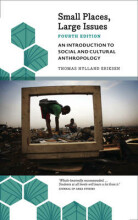Summary: History And Theory Of Anthropology
- This + 400k other summaries
- A unique study and practice tool
- Never study anything twice again
- Get the grades you hope for
- 100% sure, 100% understanding
Read the summary and the most important questions on History and theory of anthropology
-
1 Week 1
-
1.1 Lecture 1 Anthropological knowledge
This is a preview. There are 1 more flashcards available for chapter 1.1
Show more cards here -
The nature of anthropological theory: Probabailistic theories
suggesting an association between different phenomena -
What is the problem of interpretation (ar paradigms as moberg calls it)
It accounts for the fact that there are different world views and interpretations -
Anthropology as a science: Scientific view
Research would lead to generalized knowledge - explanation -
Anthropology as a science: Interpretivist view
Research leads to an understanding of particular cultural context - interpretation -
Subjectivity and reflexivity: preflexive anthropology
The anthropologists voice is autoritative (not questioned) -
Subjectivity and reflexivity: Positivism
We can study reality without taking into account the researcher's identity and beliefs -
Kuhn: scientific research is organized by paradigms. What is paradigm?
à Paradigm = set of dominant beliefs within a field that establishes standards of scientific investigation
1. Defines the problems considered relevant for research
2. Sets forth a tentative explanation of those problems
3. Establishes rules and standards for scientific procedure -
1.2 Lecture 2 Proto anthropology
This is a preview. There are 7 more flashcards available for chapter 1.2
Show more cards here -
What makes anthropology a Western project?
It is closely connected with the expansion of Europe (territory, power and wealth) until the 20th century -
Encounters with the other: Expansion Heridotus (5th century BCE)
looked at human differences; accounting for these diversities through what the people themselves did/ human practices (see the emergence of humanistic and scientific tradition) -
Auguste Comte’s theory of stages:
Idealism :Society ’sessence is itsbelief system - change occurs throughadvances inreasoning
- Higher grades + faster learning
- Never study anything twice
- 100% sure, 100% understanding
































